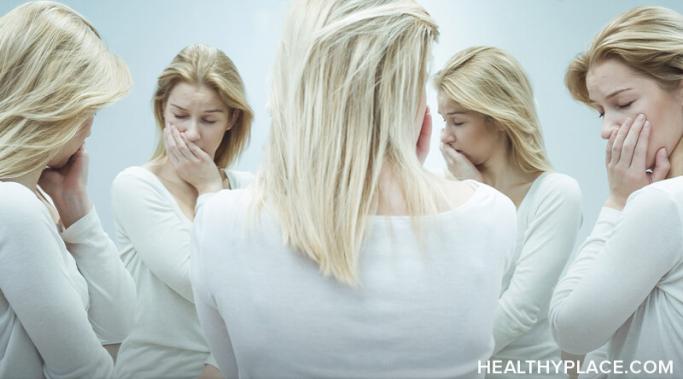Blogs
My mental health has always suffered in times of isolation and uncertainty. As someone with obsessive-compulsive disorder (OCD), I'm at my most content when I'm able to predict and control my surroundings. When that control is lost, my mind conjures terrifying hypotheticals about what "could" happen, and I start to engage in compulsive behaviors to bring order to the chaos in my mind. This exhausting cycle of thoughts and rituals invariably causes me to slip back into depression, and I'm left feeling like a failure once again. So, you would think that the uncertainty surrounding the current global pandemic would have my mental health in a tailspin. But no — it is better now than it has been in years, and it's precisely due to that uncertainty. The uncertainty leading to my isolation has improved my mental health.
If you live with any degree or type of anxiety, chances are you've wondered if anxiety will ever stop. It's natural to want anxiety to go away, to be gone from your life. Sometimes, it can seem like anxiety is here to stay and that no matter how hard you try to reduce it, it's always there. I used to wonder if anxiety would ever stop all the time, and there were times that I really believed I was stuck with anxiety forever, despite all my efforts to deal with it. As someone who has lived with significant anxiety and who has been a teacher and counselor and is now a mental health writer, I can help answer these questions: Does anxiety ever go away? Unfortunately, no (at least not completely). Are you stuck with anxiety forever? Also, fortunately, no.
When I feel stressed out about something, I organize. And when I say organize, I mean that in a pretty far-reaching way: organizing to me means not only organizing, but also cleaning, downsizing, basically anything that falls under the umbrella of getting my affairs in order. I don’t know how common this is among others. But I would like to at least try to explain why staying organized is so helpful to me.
Boredom and anxiety coincide like clockwork--when you finish that assignment, when your shift ends, or when you turn off the light to go to sleep, your thoughts start to spiral. As soon as you allow your mind to wrap around itself, anxiety sets in.
It's important to learn to move on after failure because we aren't going to succeed at everything, and failure can damage our self-esteem. Yet building self-esteem can require us to stretch beyond our limits, even though, sometimes, our efforts may not bring us the results we hope for. When our self-esteem is poor, it's hard to keep ourselves motivated and positive. How do we continue to move forward after failing?
My name is Kate Beveridge, and I am a new blogger for the "More than Borderline" blog. I’m excited to share my personal story of living with borderline personality disorder (BPD) and tips for how to cope with the illness.
Eating disorders are deadly but also treatable mental illnesses. Still, in my early struggle to recover, there were many common eating disorder treatments that didn't work for me. Understand, I am not saying that they don't work for anyone. On the contrary, they work for countless people who suffer. This said, there is no one road to recovery, and I write this blog post in the hopes of inspiring people who haven't had any luck with traditional eating disorder treatments to keep going.
"What do your alters look like?" is but one question I receive from people who do not live with dissociative identity disorder (DID). It's because one of the most fascinating parts of DID to people who don’t live with it is the concept of alters. Under the internal family system (IFS) theory, we all have parts of our personality that make us tick. While we may have one part that wants to eat a slice of cake, we might have another part that tells us to skip the empty calories. This isn’t so far from what people with DID experience, but on a more extreme basis. People living with DID may have dozens of parts to juggle regularly, which may make it slightly more challenging compared to the average person.
For the last year or so, I have been doing a lot of work to process my childhood trauma. I've been in therapy, I've been taking psychiatric medication, I've been doing outside reading, and my therapist and I even found a way to work one of my favorite TV shows into my trauma work. In general, I think it's going really well, except for one problem: parenting. I don't know how to avoid causing my son the same trauma that happened to me.
What part can dissociation play in self-harm? If you’ve never self-harmed, you probably can’t understand why anyone would do such a thing in the first place. The notion of inflicting physical pain on oneself can seem illogical and terrifying. However, self-harm can often travel with dissociation symptoms.1 This means the person who self-injures might feel physically numb or have no recollection of the event.










I read this book many years ago, just as I was entering the turmoil of remembering, questioning and doubting myself all the way (as I'd been covertly taught over a lifetime). I happened to mention to my two sisters one day, "This is so strange but I've been diagnosed with PTSD." Both my sisters surprised me by responding, "Me too."
THEN I happened upon an old book manuscript that my now deceased father had written (not published), wherein the protagonist was obviously based upon himself and he rapes his "fiancee," who had my unusual name. Yes, truly.
Then I made myself look at the peculiar memory I always had where he violently threatened me but somehow I had never been able to recall what came before or after the episode. I had to admit that was a bit strange.
The pressures and powers to forget sexual abuse are great, both in family and society. In fact, I've come to the sad conclusion that the vast majority of survivors never really deal with their childhood wounds (a neglect for which there are always repercussions).
To critique an encouragement of people trusting their intuition in such matters is really getting the prescription dangerously wrong.
Thanks!